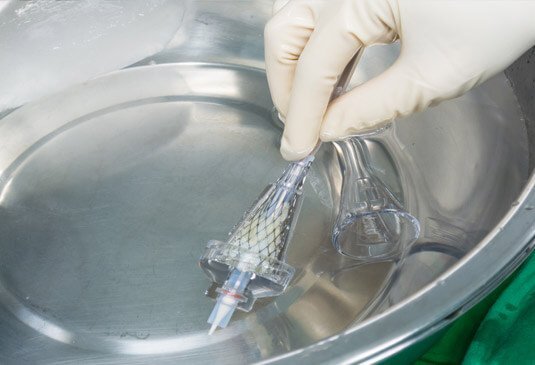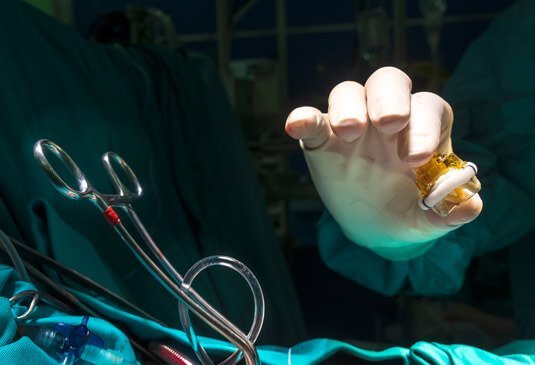Transcatheter Aortic Valve Replacement (TAVR)

A healthy heart maintains normal blood flow in its four chambers. This function is performed by its four valves, which open and close between heartbeats. Proper valve opening and closure ensure blood flow in the right direction through the heart, such that blood does not flow backward (backward regurgitation). The aortic valve allows the blood to exit from the heart and flow to the rest of the body. Its function is disturbed in aortic stenosis wherein the aortic valve opening narrows.
Aortic stenosis is a serious condition and prevents the aortic valve from opening fully or moving easily. Thus, the heart’s ability to pump blood to the rest of the body is affected. In some cases, the aortic valve may be damaged, causing regurgitation as the blood flows backward into the heart. The heart has to work harder to pump blood when this happens, and if aortic stenosis is left untreated, it can lead to heart failure or even sudden death.
Aortic stenosis may be caused due to hereditary factors, aging, rheumatic fever, or build-up of calcium or cholesterol on the leaflets, etc. Some of its observable symptoms are:
- Chest pain
- Shortness of breath
- Heart palpitations
- Fatigue
- Swelling in the legs
There is no drug therapy to cure aortic stenosis, and it requires valve replacement. This may be done through open surgery or a minimally invasive approach.
What is TAVR?
Transcatheter Aortic Valve Replacement (TAVR) is a proven surgical approach to replace a narrowed aortic valve. It is an ideal surgical option for high-risk patients who cannot have open-heart heart surgery. During the TAVR procedure, a prosthetic valve is implanted using a catheter and expanded over the existing valve. Thus, the artificial valve is wedged into place without removing the old valve.
The valve begins functioning immediately after its in place. Also known as Transcatheter Aortic Valve Implantation (TAVI), this procedure allows the aortic valve to be repaired without major surgery and is completed in a span of two hours.

Who is a good candidate for TAVR?
TAVR surgery is recommended for: High-risk aortic stenosis repair surgery:
If a patient is at intermediate or high-risk complications for surgical aortic valve replacement, TAVI heart treatment is indicated. This helps avoid surgical complications due to:
- Old age
- Previous heart surgery
- Kidney disease
- Lung disease
- Diabetes
- Calcified aorta
Patients who have undergone aortic valve replacement surgery before, but whose artificial valve is not functioning properly anymore.
A multidisciplinary team of doctors comprehensively evaluate each patient by conducting appropriate diagnostic tests to determine if the procedure is a good treatment option for the patient.
How is TAVR different from surgical valve replacement?
TAVR treatment has several benefits over the conventional procedure to surgically replace the aortic valve. These include:
- It is a minimally invasive procedure that can be performed in the cath lab.
- No general anesthesia is required as the chest is not opened.
- It can be performed under mild anesthesia so that the patient is awake.
- No big scar after the procedure.
- A short hospital stay of 3-4 days.
- Return to normal life soon after discharge.
- Lower risk for patients with serious health conditions.
Thus, TAVI procedure risks are minimal and patients can recover quickly without any postoperative side-effects.
Preparing for TAVR
Before the TAVI procedure, the patient may have to adjust their medication and habits like eating or drinking water according to the needs of the treatment. The treatment team will generally discuss these factors with the patient. Some factors that require consideration are:
- Medication: If the patient is on regular medication, he/she should discuss with the doctor whether they can be taken before the procedure.
- Ingestion: The patient may have to avoid eating or drinking before the procedure.
- Allergies: The patient should discuss their allergies, if any, with the doctor before the procedure. This includes any reactions to medicines.
- Clothing and accessories:The patient should avoid wearing jewelry and other accessories such as eyeglasses, contact lenses, dentures, etc. during the procedure
What happens during TAVR?
The following are TAVR procedure steps:
- Monitoring the heart: A team of interventional cardiologists, imaging specialists, cardiac anesthesiologists, cardiac surgeons, and other specialists will monitor the patient’s heart function during the procedure.
- Incision to access the heart: The heart is accessed through a point in the leg or chest.
- Insertion of catheter: A catheter (hollow tube) is inserted through the access point and guided to the heart via blood vessels.
- Guiding the catheter: Advanced imaging techniques are used to carefully guide and position the tube at the aortic valve.
- Positioning the valve: A balloon is inflated to press the valve into place. Some valves may not require a balloon to settle into place.
- Removal of catheter: Once the surgeon confirms that the valve has been positioned properly, the catheter is withdrawn from the blood vessels, and the incision is closed.
Precautions after TAVR
Typically, patients spend a night in the ICU after the procedure. Generally, they are discharged within 2-5 days. Some precautions to be followed afterward are:
Monitoring for heart failure:
Patients with aortic stenosis may develop heart failure over time. Thus, if they notice any of the symptoms below, they should consult their doctor:
- Cough or congestion
- Swelling in the legs
- Chest pain
- Shortness of breath
- Palpitations
Care for procedure site:
The procedure site is susceptible to infections if not maintained hygienically. Therefore, the patient should:
- Inspect the site every day after washing their hands.
- Not soak, or swim for 2 weeks after the procedure so as to keep the site dry. It can be washed with soap and water while showering.
- Not leave the dressing on the site for more than 24 hours.
- Avoid applying lotions or ointments to the procedure site.
Blood-thinning medications may be required after the procedure to prevent blood clots.
The patient is at a higher risk of infection after TAVR, thus the doctor may prescribe medicines accordingly.
Why choose Yashoda Hospitals?
Yashoda Hospitals is a leading provider of healthcare in India, with three decades of experience to its credit. Our team of leading specialists consists of cardiac surgeons, cardiac anesthesiologists, cardiac radiologists, and interventional cardiologists who evaluate and treat each patient jointly. Their expertise is complemented with the latest technology and clinical excellence to deliver the best cardiac care.
- Holistic care: Each case is evaluated separately to deliver personalized treatment that would best suit the patient’s needs.
- Multidisciplinary team: A multidisciplinary team of specialists is present during each procedure to manage every minute detail of the procedure.
- Expertise in healthcare: With three decades of experience in delivering healthcare, our cardiologists have extensive experience in performing TAVR.
- Advanced technology: We complement the expertise of our cardiologists with the latest imaging technologies and equipment. Better planning leads to better outcomes.




 Appointment
Appointment Second Opinion
Second Opinion WhatsApp
WhatsApp Call
Call More
More





